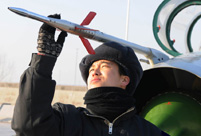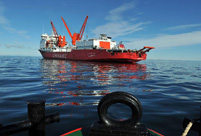BEIJING, Jan. 22 -- Despite challenges against efforts to stimulate world growth, positive results from China's economic restructuring will help accelerate recovery by offering new opportunities and momentum to global trade and investment.
The annual meetings of the World Economic Forum (WEF) at Davos starting Wednesday will take a closer look at China's financial, economic and social reforms, and debate their impact on world economy in the coming years, with a series of comprehensive sessions planned throughout the four-day event.
Noticing the drastic changes that have taken place in the width and depth of China's economic reforms since the Third Plenary Session of the 18th Central Committee of the Communist Party of China held in November 2013, participants at Davos are set to analyze how the structural changes are shaping China's future.
China's economic restructuring focuses on three aspects of strategic adjustment: the overall demand, the industrial mix and the production input.
China had relied heavily on investment and export to promote economic growth but domestic consumption has now been given a bigger role. How to strike a balance between investment and consumption is one of the topics to be discussed at Davos.
The economic model based on domestic consumption promotes stable growth, is conducive to attracting foreign investment and will be a stimulus to surrounding countries and world economy.
Expanding China's domestic demand will further release the potential of its domestic market. China is looking to import 10 trillion U.S. dollars worth of products in the next five years, with an annual increase of 27 percent, exceeding export growth by 5 percentage points.
The rising consumption in the Chinese market will become a significant driving force for global growth. Those with attractive products and services for Chinese customers will have more opportunities in the future.
China's growth used to rely on the mining, manufacturing and power sectors, which will be replaced by a more balanced industrial structure combining the sectors as well as agriculture and service.
Last year, the service sector's annual output topped that of the industrial sector for the first time, marking historic progress in the country's economic adjustment. Restructuring industries and state-owned enterprises in China has become another focus for Davos discussions.
To improve growth efficiency, the old input and consumption model based on material resources will be replaced by one based on technological innovation, raising workforce quality and system reforms. Addressing talent and innovation gaps, as well as incorporating sustainability into China's growth models are also on the agenda of the WEF.
The shift of priority to improve growth quality by pursuing green and sustainable development and pushing forward industrialization, informatization, urbanization and agricultural modernization, will create a large-scale fresh market for the world and also encourage Chinese companies to invest overseas and seek economic and technological cooperation.
Statistics from the Ministry of Commerce point to the trend. In the first 10 months of 2013, China's non-financial foreign direct investment (FDI) rose 20 percent. In 2012, China's FDI increased 17.6 percent to a record 87.8 billion dollars, making it the third biggest source of FDI following the United States and Japan. The trend and impact of Chinese outbound investment will be debated at Davos.
By the end of 2015, China aims to lower its energy consumption by 16 percent per GDP unit from 2010 levels and lower its carbon emissions per GDP unit by 17 percent. New energy and strategic industries are expected to emerge in the country and will require international cooperation.
Concerned about China's drive to go green, participants at the WEF meetings will also discuss the implications of China's slower growth and the long-term effects of greater resource efficiency.
While various elements in the global financial market and commodity supplies as well as uncertainties in the endeavor to reshape world trade and investment rules threaten the global economic recovery, China's upgraded economy will serve as an engine for world growth as well as a stabilizer amid challenges and risks, echoing a topic at Davos: "China takes center stage." Enditem
This article is part of Xinhua's integrated coverage on the 2014 World Economic Forum, "Eyes on Davos: A Chinese Perspective."
 Su-30 fighter formation taking off for training
Su-30 fighter formation taking off for training  Xuelong carries on mission after breaking from floes
Xuelong carries on mission after breaking from floes Charity exhibition raises money for panda protection
Charity exhibition raises money for panda protection 'Map of China' on the stone
'Map of China' on the stone  Chinese naval escort taskforce repels 4 suspicious vessels
Chinese naval escort taskforce repels 4 suspicious vessels World's weekly photos (1.6-1.12)
World's weekly photos (1.6-1.12) Li Na crashes Belinda Bencic in 2nd round at Australian Open
Li Na crashes Belinda Bencic in 2nd round at Australian Open Weekly sports photos
Weekly sports photos China's national pole dancing to play 'The Butterfly Love'
China's national pole dancing to play 'The Butterfly Love'  The never-ending Silk Road
The never-ending Silk Road  Spring Festival travel rush: One window, one world
Spring Festival travel rush: One window, one world Int'l Snow Sculpture Art Expo in Harbin
Int'l Snow Sculpture Art Expo in Harbin China photographs internal structure of water molecule
China photographs internal structure of water molecule 'Predator' makes proposal to girlfriend
'Predator' makes proposal to girlfriend Thousands of fish frozen on Norway sea
Thousands of fish frozen on Norway seaDay|Week|Month